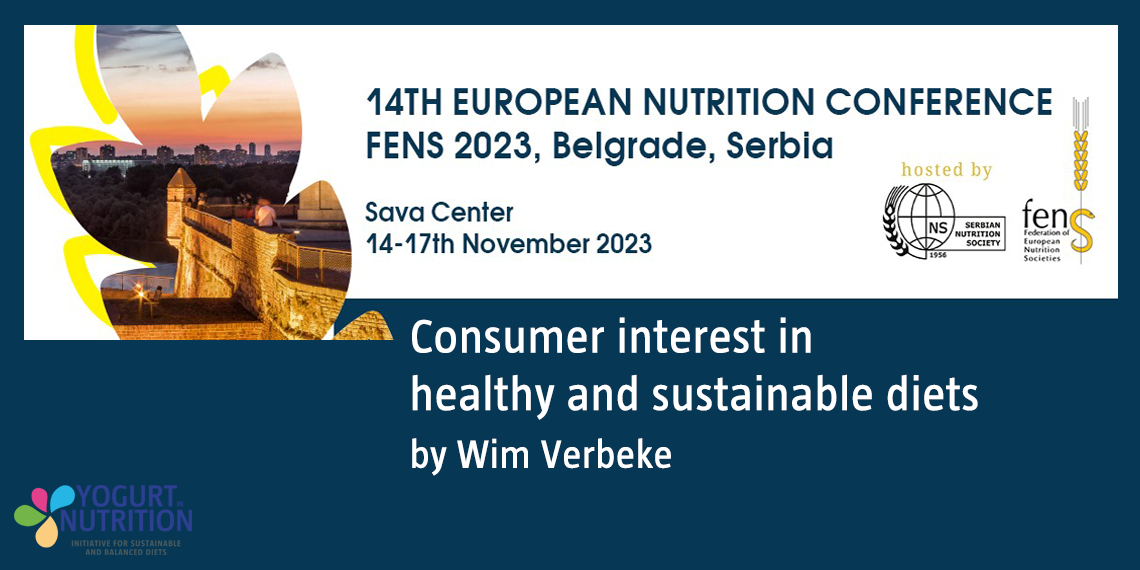The 14th European Nutrition Conference (FENS) took place in November in Belgrade, and we were there to cover and share with you some insightful topics.
In the session “Plant-based Diets: Transition to a Healthy Plate and Planet,” Professor Wim Verbeke from Ghent University focused specifically on consumer interest in health and sustainable diets.
Consumer Interest in Health and Sustainable Diets, briefly:
The consumer expectations in food production and products are growing, driven by a heightened awareness of the interconnection between dietary habits, environmental impact, and health outcomes. Integrating health and sustainability goals has become a crucial focus, acknowledging the potential for developing diets that are both environmentally sustainable and healthy. The success of such diets, however, hinges on consumers’ willingness and ability to change their behavior.
Investigating the consumer perceptions of the match between healthy and sustainable diets may help build accurate insights into consumers’ motivation to eat healthily and sustainably.
In a study assessing consumers’ involvement in healthy and sustainable eating, four distinct consumer segment profiles have been identified (1):
- uninvolved segment,
- moderately involved,
- involved in healthy eating
- the health and sustainability involved segment.
Approximately half of the participants demonstratedhigh involvement in healthy eating, with one-third showing interest in both healthy and sustainable eating.
Consideration of consumers’ levels of involvement in health and sustainability is essential for targeted and effective interventions. Informational food policy actions targeting both healthy and sustainable food consumption behaviors are recommended. Tailoring strategies to address the preferences and concerns of different consumer segments is crucial.
The images of a healthy diet, a sustainable diet, and a plant-based diet are perceived as highly compatible among European consumers and the strong match between perceptions of health and sustainability concepts suggests a convergence in consumer understanding.
Key Messages :
- Consumers have increasingly high expectations related to various attributes of food, including health, taste, environment, and safety.
- A multitude of factors, including health and sustainability considerations, shape consumers’ food choice decisions.
- There is a robust alignment between the concepts of “health” and “sustainability” in consumers’ perceptions.
Professor Wim Verbeke’s insights underscore the nuanced and diverse nature of consumer preferences, emphasizing the importance of understanding and addressing individual motivations and levels of involvement in order to promote healthy and sustainable eating
Source: Van Loo E, Hoefkens C, Verbeke W, Healthy, sustainable and plant-based eating: Perceived (mis)match and involvement-based consumer segments as targets for future policy, Food Policy, 2017, 69:46-57
Learn more with Prof. Wim Verbeke
Hello, can you introduce yourself?
Wim Verbeke: I’m Wim Verbeke. I’m a professor of agro-food marketing and consumer behavior at Ghent University in Belgium. I’m a bioscience engineer, so I have a background in natural sciences and also an MBA in marketing management. I combine natural and social sciences backgrounds. Most of my research is on food consumer behaviors, consumer decisions related to food safety, nutrition, health, sustainability.
Regarding the consumers, how can we address them to promote a plant-based sustainable diet?
Wim Verbeke: Effective communication for promoting a plant-based sustainable diet must be tailored to the specific needs and interests of consumer groups. As I discussed in the presentation, there are segments, groups of consumers that are absolutely not interested. In my opinion, it makes little sense to target your communication to those groups, but what matters really is those segments that are still a little bit undecided. There is a group of people who are enthusiastic about protein transition and novelties, who are already convinced. These segments deserve focused attention and communication efforts.
And what are the barriers that these segments encounter and why don’t they go further?
Wim Verbeke: Barriers vary widely based on product type and consumer preferences.
The barrier can be unfamiliarity, so that means if you can make those people familiar with the product, they may be keener on trying it. For some, it will be the fear of trying something new and for others, there is skepticism about health benefits, or an interest in sustainability. In that case, providing knowledge may help.
It’s really depending on the segment, on the product, on the person to some extent as well and making information available is really crucial.
During the FENS congress, we saw another presentation made by Esther Papies, where the key message was that we communicate a lot about sustainability and health and that we should communicate more about the taste and enjoyment of plant-based food. Do you think it could help the very hesitant or target?
Wim Verbeke: In those segmentation studies, some groups prioritize taste and pleasure. Offering a clear promise and convincing them about the delightful aspects of plant-based products, through opportunities to taste, can be effective.
Others may be willing to compromise a bit on taste for the promise of a healthier product. It all depends on the specific consumer segment.
In your presentation, you mentioned that elderly consumers are more interested in plant-based protein. Did you mean raw products like beans, or more processed foods?
Wim Verbeke: In the study, the focus was on alternative proteins, not specifically defined as plant-based proteins. Elderly consumers tended to think more about raw products, possibly associating with pulses and legumes, which they might be more familiar with than younger generations. Their interest leaned towards raw products rather than ingredients like powders found in protein shakes.
Wim Verbeke is professor at Faculty of Bioscience Engineering at the Ghent University, Belgium. His research disciplines are Agricultural and natural resource economics, environmental and ecological economics, consumer behavior, market research and marketing.



